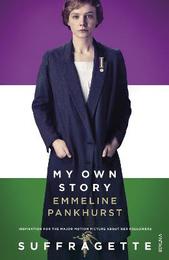
|
My Own Story: Inspiration for the major motion picture Suffragette
Paperback / softback
Main Details
| Title |
My Own Story: Inspiration for the major motion picture Suffragette
|
| Authors and Contributors |
By (author) Emmeline Pankhurst
|
| Physical Properties |
| Format:Paperback / softback | | Pages:352 | | Dimensions(mm): Height 198,Width 129 |
|
| Category/Genre | Memoirs |
|---|
| ISBN/Barcode |
9781784871253
|
| Classifications | Dewey:324.623092 |
|---|
| Audience | | General | | Tertiary Education (US: College) | | Professional & Vocational | |
|---|
| Edition |
Media tie-in
|
|
Publishing Details |
| Publisher |
Vintage Publishing
|
| Imprint |
Vintage Classics
|
| Publication Date |
24 September 2015 |
| Publication Country |
United Kingdom
|
Description
The great leader of the women's suffrage movement tells the story of her fight for equality The great leader of the women's suffrage movement tells the story of her struggles in her own words. Emmeline Pankhurst grew up all too aware of the prevailing attitude of her day- that men were considered superior to women. When she was just fourteen she attended her first suffrage meeting, and returned home a confirmed suffragist. Throughout the course of her career she endured humiliation, prison, hunger strikes and the repeated frustration of her aims by men in power, but she rose to become a guiding light of the Suffragette movement. This is the story, in Pankhurst's own words, of her struggle for equality.
Author Biography
Emmeline Pankhurst was born in 1858 in Manchester, into a politically active family. She became interested in politics at a young age and a supporter of women's suffrage by the age of fourteen. As a teenager she attended school in Paris and on her return to Manchester she met and married Richard Pankhurst, a barrister twenty-four years her senior. Over the next ten years they had five children. Emmeline's interest in politics and involvement in the suffrage movement continued to develop and she was a member of the Women's Franchise League and later the Independent Labour Party. In 1903, frustrated by the lack of progress on securing votes for women, Pankhurst and several colleagues founded the Women's Social and Political Union (WSPU), a militant organisation devoted to securing votes for women by direct action. For the following twenty years, members of the WSPU, led by Pankhurst, endured prison and hunger strikes in their struggle to win the right to vote. Their activities were called to a halt by the start of the First World War but in 1918, the government gave voting rights to women over thirty. Emmeline died on 14 June 1928, shortly after women were granted equal voting rights with men.
ReviewsShe shaped an idea of women for our time; she shook society into a new pattern from which there could be no going back * Time * She put body and soul at the service of liberty, equality and fraternity and secured a triumph for them -- Rebecca West Emmeline Pankhurst fought for women's suffrage with indomitable courage * Guardian * The finished product rests somewhere between a gripping novel and a painstaking historical record. No view of the suffragette story is complete without this comprehensive puzzle piece. -- Jacqui Agate * The Independent * She shaped an idea of women for our time; she shook society into a new pattern from which there could be no going back * Time *
|